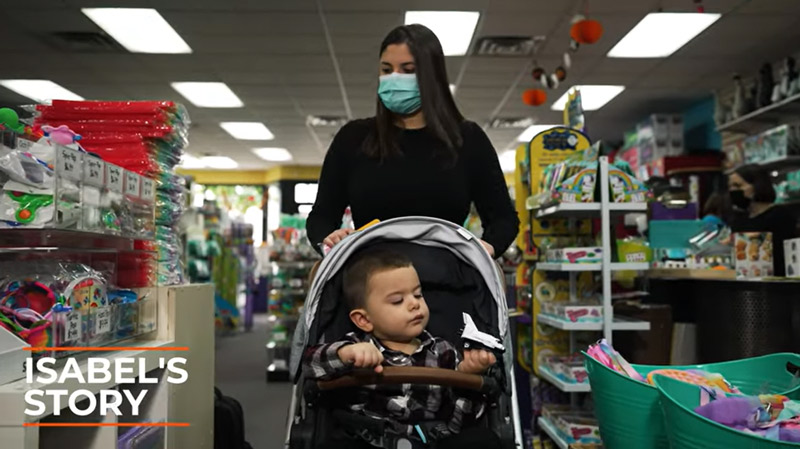Isabel's Story
When Isabel C. learned she had a complex brain tumor shortly after giving birth, she set out to find a team with expertise and compassion so she could focus on her family.
Conquering a Brain Tumor with a Care Team That Feels Like Family

For 33-year-old Isabel C., family means everything. When she learned she had a brain tumor shortly after giving birth, her first concern was for her two young children.
“My world immediately turned upside-down,” says Isabel. “But not once did I think about me. I only thought about my kids, my babies.”
A few weeks after having her son, Isabel began experiencing gastric rising symptoms during her sleep. She said it’s similar to the feeling you get in your stomach when you’re riding a rollercoaster.
Doctors attributed the episodes to stress or potentially postpartum depression. She suspected something else was at play.

“I continued living my normal life, but one day I had a very clear wake-up call,” she explains. “I took my kids to a nearby park, which we had done so many times before. When it was time to go home, I completely forgot where we lived. That’s when I knew something was really wrong.”
Isabel went to see a different physician, who recognized that her nighttime episodes were likely seizures. She was referred to a neurologist and had an MRI done, which revealed Isabel had a large brain tumor on her right temporal lobe.

After doing her research to find a surgeon, Isabel narrowed in on Yaron A. Moshel, MD, PhD, a neurosurgeon and co-director of Atlantic Health System's Gerald J. Glasser Brain Tumor Center.
“The moment I met Dr. Moshel, I knew he was the surgeon I wanted to remove my brain tumor. He is compassionate, kind, caring and provided an immediate sense of calm,” notes Isabel. “He took the time to listen to every single concern I had, and I knew I didn’t want to go anywhere else for my surgery.”
Isabel’s tumor, a diffuse astrocytoma, was located deep in the temporal lobe and was compressing her midbrain, the top part of the brainstem.
The entire team of doctors, nurses and staff treated me like family. They are my angels who cared for me with love. Thanks to them, I’m alive. I’m able to watch my kids grow."
“These deep-seated areas are fraught with surgical risk,” Dr. Moshel explains. “There are small blood vessels the size of a single strand of hair that, if disrupted, can cause a stroke. This part of the brain also sits right next to the internal capsule, the information highway that carries signals to and from the spinal cord. Disrupting it can lead to paralysis, which would be life-changing, especially for a young mother.”
To give herself the best chance of conquering her tumor, Isabel entrusted Dr. Moshel to remove as much of the tumor as possible. Doing so required a specialized and extremely precise surgical approach.
The surgery was performed at Overlook Medical Center with intraoperative monitoring, whereby the surgical team directly stimulated the deep white matter of the brain during the procedure in order to measure how far away they were from the internal capsule. They also used fluorescent staining to define the boundaries of the brain tumor as well as image guidance to navigate the surgery with pinpoint accuracy – and avoid disturbing critical brain tissue.

“To determine a post-operative course of treatment, we don’t just look at the tissue under the microscope anymore. We examined the presence and absence of different mutations in Isabel’s tumor, enabling us to explore what treatments would work best and craft a treatment plan tailored specifically for her,” explains Atlantic Health System neuro-oncologist Nicholas Metrus, MD. “There is a wealth of information at the DNA level, and its importance is more and more evident the more we learn about it.”
Isabel adds, “The entire team of doctors, nurses and staff treated me like family. They are my angels who cared for me with love. Thanks to them, I’m alive. I’m able to watch my kids grow. And I’m enjoying every day with my own family. We will be forever thankful to the Gerald J. Glasser Brain Tumor Center.”